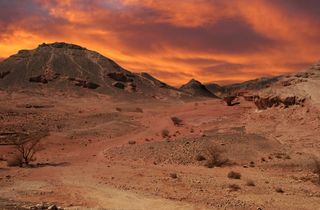
The Middle East has depleted its water reserves at a frightening pace over the last several years, according to a new study.
From 2002 to 2009, the region lost enough water from groundwater, soil, snowmelt and reservoirs to fill the entire Dead Sea — about 117 million acre-feet (144 cubic kilometers). The majority of that water loss comes from aggressive pumping of groundwater.
The findings were published online Jan. 10 in the journal Water Resources Research.
Sky scale
The team was using satellite data from NASA's Gravity Recovery and Climate Experiment (GRACE) project, which measures the change in mass on the Earth below it. The project's primary goal was to track changes in ice sheets.
"GRACE is like a giant scale in the sky, it responds to gravity changes, the satellites are perturbed and they move around in their orbits due to changes in mass," said study co-author James Famiglietti, a hydrologist at the University of California, Irvine.
The twin satellites take advantage of the fact that gravity's tug on a spot is proportional to its mass. And water is by far the heaviest thing that changes on Earth, so gravity changes can reveal how much water has been lost. [6 Weird Facts About Gravity]
Sign up for the Live Science daily newsletter now
Get the world’s most fascinating discoveries delivered straight to your inbox.
Dramatic losses
Famiglietti and his colleagues found that the Tigris Euphrates Basin, which spans parts of Turkey, Syria, Iran and Iraq, lost an average of 16 million acre-feet (20 cubic kilometers) a year during the period of the study. By analyzing other data that tracked other water levels, such as the amount of snowmelt and reservoir levels in the region, the team concluded that most of the depletion came from pumping groundwater.
A drought during that time period may have depleted reservoirs and snowmelt, causing people to more aggressively pump groundwater, Famiglietti told LiveScience.
The findings are even more worrisome, because climate change is projected to reduce rainfall in the region, causing even more water troubles, he said.
Improve efficiency
The vast depletion of groundwater could spell trouble in a region that already has many conflicts over water. To prevent depletion, the region needs to improve how efficiently they harness water.
Because 80 percent of the world's water usage is for agriculture, employing water-sparing techniques like precision drip irrigation, which aims water under the soil straight to a plant's roots, could avert catastrophe, he said.
Tracking groundwater use is also essential, Famiglietti said.
"Groundwater use has historically not been monitored," he said. "If we think of it as our money in the bank, we better keep track of the account balance."
Follow LiveScience on Twitter @livescience. We're also on Facebook & Google+.

Tia is the managing editor and was previously a senior writer for Live Science. Her work has appeared in Scientific American, Wired.com and other outlets. She holds a master's degree in bioengineering from the University of Washington, a graduate certificate in science writing from UC Santa Cruz and a bachelor's degree in mechanical engineering from the University of Texas at Austin. Tia was part of a team at the Milwaukee Journal Sentinel that published the Empty Cradles series on preterm births, which won multiple awards, including the 2012 Casey Medal for Meritorious Journalism.
